9 Best Herbal Tinctures For Inflammation
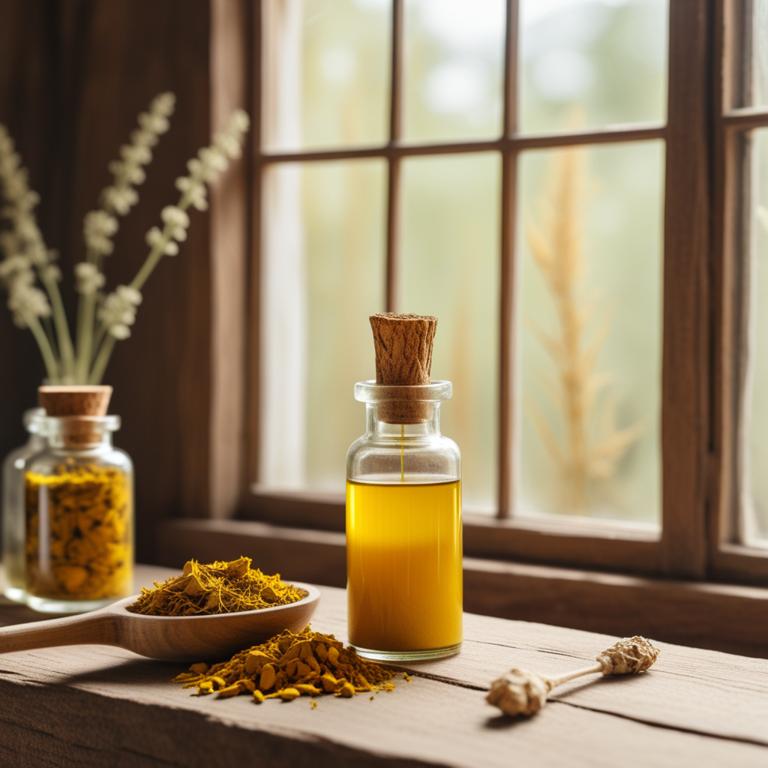
Herbal tinctures for inflammation are highly concentrated liquid extracts made from plants, used to treat and manage inflammation-related ailments.
These tinctures offer numerous benefits, including reduced pain, swelling, and inflammation, as well as improved overall well-being.
Some examples of herbal tinctures used to treat inflammation include turmeric tincture, which contains curcumin to reduce joint pain and inflammation; ginger tincture, which has anti-inflammatory properties to alleviate arthritis symptoms; willow bark tincture, which contains salicin to mimic the effects of aspirin; St. John's Wort tincture, which has anti-inflammatory and antioxidant properties to soothe skin irritations; and boswellia tincture, which is known for its ability to reduce inflammation and pain in the joints.
Additionally, herbal tinctures like cayenne pepper, green tea, and yucca also have anti-inflammatory properties, making them useful in treating inflammation-related conditions.
According to the provided study, tinctures for inflammation can be made from various medicinal herbs such as Curcuma longa, Zingiber officinale, Rosmarinus officinalis, Borago officinalis, evening primrose, and Devil's claw, which have shown anti-inflammatory effects in clinical and experimental studies.
Below there's a list of the 9 best herbal tinctures for inflammation.
- 1. Arnica montana tinctures
- 2. Curcuma longa tinctures
- 3. Zingiber officinale tinctures
- 4. Salix alba tinctures
- 5. Echinacea purpurea tinctures
- 6. Tanacetum parthenium tinctures
- 7. Ginkgo biloba tinctures
- 8. Glycyrrhiza glabra tinctures
- 9. Eucalyptus globulus tinctures
Also you may be interested in...
TODAY'S FREE BOUNDLE
Herb Drying Checklist + Herbal Tea Shopping List + Medicinal Herbs Flashcards
Enter you best email address below to receive this bundle (3 product valued $19.95) for FREE + exclusive access to The Aphotecary Letter.
$19.95 -> $0.00
1. Arnica montana tinctures
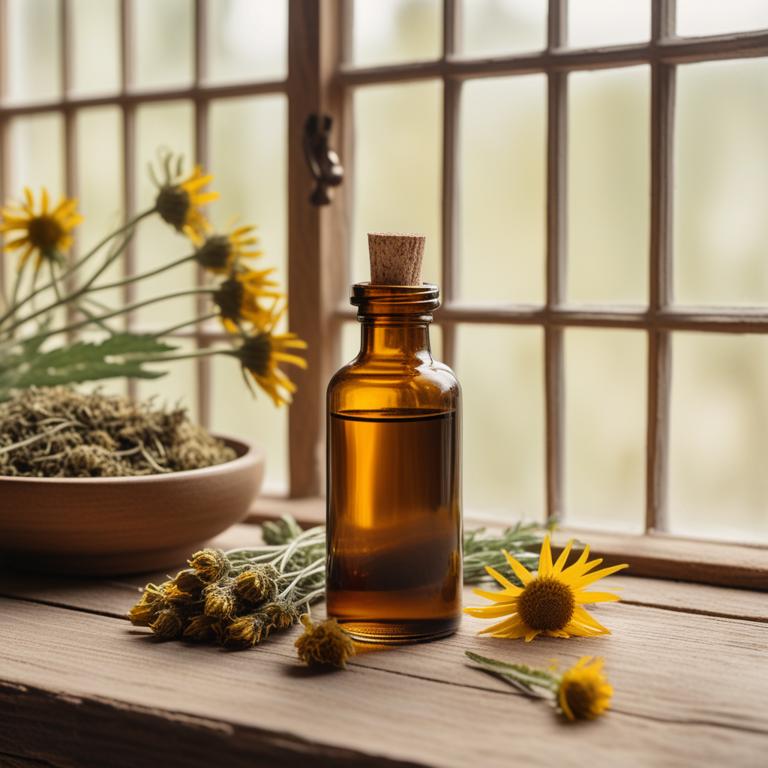
Arnica montana tinctures have been traditionally used to treat inflammation and alleviate symptoms associated with conditions such as sprains, bruises, and arthritis due to their anti-inflammatory and analgesic properties.
The bioactive constituents of Arnica montana, including flavonoids, phenolic acids, and sesquiterpene lactones, help to reduce inflammation by inhibiting the production of pro-inflammatory enzymes and cytokines.
By reducing swelling and pain, Arnica montana tinctures provide relief from inflammation-related discomfort, allowing individuals to recover faster and with less pain.
The benefits of using Arnica montana tinctures to treat inflammation include reduced swelling, pain relief, and improved mobility, making it a popular herbal remedy among individuals seeking natural alternatives to conventional treatments.
Related Study
According to the "Journal of integrative medicine", Arnica montana tinctures for inflammation may modify the expression of genes involved in inflammation and connective tissue regeneration.
2. Curcuma longa tinctures

Curcuma longa tinctures, derived from the rhizomes of the turmeric plant, possess potent anti-inflammatory properties that help to alleviate the symptoms of inflammation.
This herbal preparation works by inhibiting the production of pro-inflammatory enzymes, such as cyclooxygenase-2 (COX-2) and lipoxygenase (LOX), thereby reducing inflammation and pain.
The bioactive constituents of Curcuma longa tinctures, including curcuminoids (curcumin, demethoxycurcumin, and bisdemethoxycurcumin), polyphenols, and flavonoids, contribute to its therapeutic effects.
Regular use of Curcuma longa tinctures has been shown to provide significant benefits in treating inflammation, including reduced pain, improved joint mobility, and enhanced overall well-being.
Related Study
According to the study, Curcuma longa tinctures for inflammation are effective due to the anti-inflammatory properties of curcumin, a chief constituent of Curcuma longa, which has been shown to modulate physiological and biochemical processes.
3. Zingiber officinale tinctures

Zingiber officinale tinctures, derived from the rhizome of the ginger plant, have been traditionally used to treat inflammation and related ailments.
The anti-inflammatory properties of ginger tinctures are attributed to the presence of bioactive constituents such as gingerols and shogaols, which help to reduce swelling and pain associated with inflammation.
These bioactive compounds work by inhibiting the production of pro-inflammatory enzymes and cytokines, thereby alleviating inflammation and promoting healing.
The benefits of using ginger tinctures to treat inflammation include reduced pain and discomfort, improved joint mobility, and accelerated recovery time, making it a popular natural remedy for various inflammatory conditions.
Related Study
According to "Journal of ethnopharmacology", Zingiber officinale tinctures for inflammation have been shown to reduce carrageenan-induced paw swelling in rats, indicating potential anti-inflammatory properties.
4. Salix alba tinctures
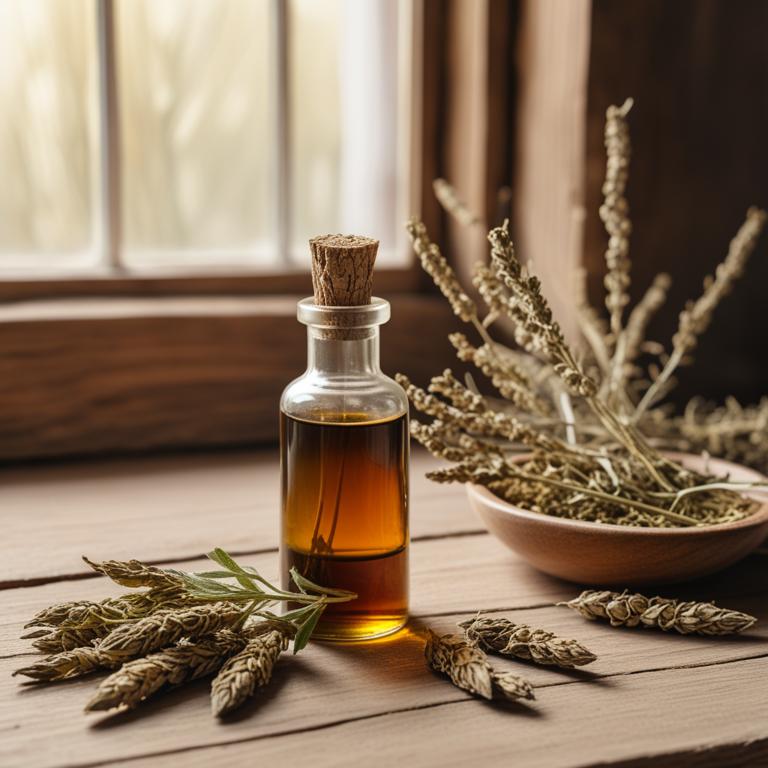
Salix alba tinctures have been used to treat inflammation due to their anti-inflammatory and antioxidant properties, which help to reduce swelling and ease pain.
The bioactive constituents of Salix alba tinctures, including salicin, salicylic acid, and flavonoids, work together to inhibit the production of pro-inflammatory enzymes and cytokines, thereby alleviating inflammation.
By reducing inflammation, Salix alba tinctures help to promote healing, relieve pain, and improve overall well-being.
The benefits of using Salix alba tinctures to treat inflammation include reduced pain and swelling, improved mobility, and a faster recovery time, making them a popular natural remedy for various inflammatory conditions.
Related Study
According to "Recent patents on inflammation & allergy drug discovery", Salix alba tinctures for inflammation may possess anti-inflammatory activity due to the presence of phytoconstituents such as salicin, a compound similar to aspirin, which can prevent undesirable inflammatory processes.
5. Echinacea purpurea tinctures

Echinacea purpurea tinctures have been used to treat inflammation ailments due to their anti-inflammatory and immunomodulatory properties.
The tincture contains bioactive constituents such as alkylamides, phenolic acids, and glycosides, which help to reduce inflammation and modulate the immune system.
By reducing the production of pro-inflammatory cytokines and increasing the production of anti-inflammatory cytokines, Echinacea purpurea tinctures help to alleviate symptoms associated with inflammation, such as pain, redness, and swelling.
The benefits of using Echinacea purpurea tinctures to treat inflammation include reduced discomfort, improved wound healing, and enhanced overall well-being.
Related Study
According to "The Journal of nutritional biochemistry", Echinacea purpurea tinctures for inflammation may be effective due to the presence of alkamides, specifically dodeca-2E,4E,8Z,10Z(E)-tetraenoic acid isobutylamides, which were found to inhibit COX-2 activity and the expression of pro-inflammatory cytokines and chemokines, while also elevating heme oxygenase-1 protein expression.
6. Tanacetum parthenium tinctures
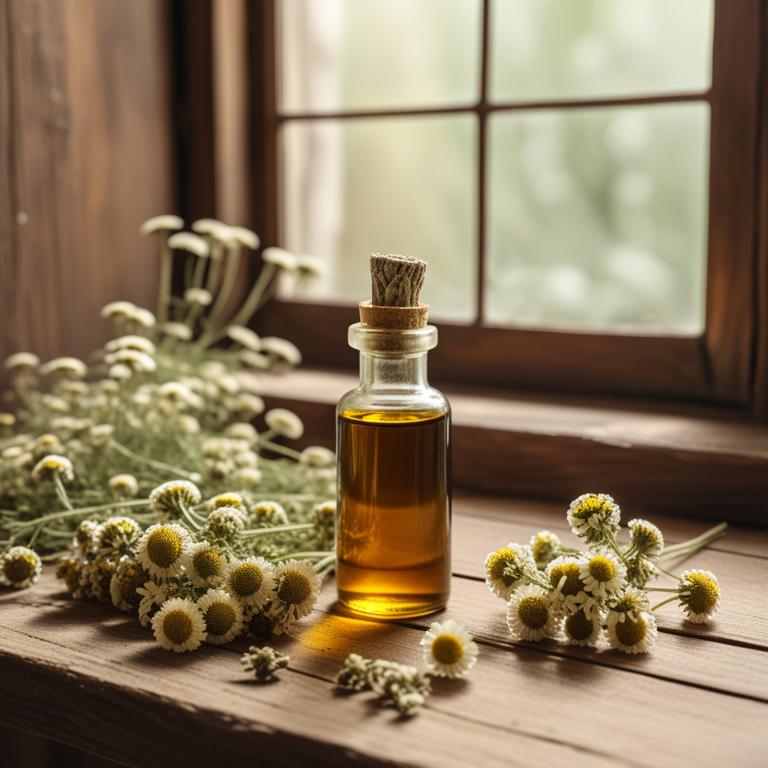
Tanacetum parthenium tinctures, also known as feverfew, have been traditionally used to treat inflammation-related ailments due to their anti-inflammatory properties.
The herbal preparation helps to alleviate inflammation by inhibiting the production of pro-inflammatory mediators, such as prostaglandins and leukotrienes.
The bioactive constituents responsible for this action include sesquiterpene lactones, particularly parthenolide, which has been shown to possess anti-inflammatory and anti-migraine properties.
Regular use of Tanacetum parthenium tinctures may help to reduce inflammation and alleviate symptoms associated with conditions such as arthritis and migraines.
Related Study
According to "Cellular immunology", Tanacetum parthenium tinctures for inflammation have been shown to inhibit the expression of intercellular adhesion molecule-1 (ICAM-1) induced by cytokines, such as IL-1, TNF-alpha, and interferon-gamma, resulting in anti-inflammatory effects.
7. Ginkgo biloba tinctures

Ginkgo biloba tinctures have been traditionally used to treat inflammation ailments due to their anti-inflammatory properties, which help to reduce swelling and pain.
This herbal preparation contains bioactive constituents such as flavonoids and terpenoids, specifically bilobalide and ginkgolides, that have been shown to inhibit the production of pro-inflammatory cytokines and enzymes.
By reducing inflammation, Ginkgo biloba tinctures can help to alleviate symptoms associated with conditions such as arthritis, and promote healing and recovery.
The benefits of using Ginkgo biloba tinctures to treat inflammation include reduced pain and swelling, improved joint mobility, and enhanced overall well-being.
Related Study
According to "Yao xue xue bao = Acta pharmaceutica Sinica", Ginkgo biloba tinctures for inflammation may inhibit the production of pro-inflammatory cytokines IL-1beta and TNF-alpha, while up-regulating the production of anti-inflammatory cytokine IL-10.
8. Glycyrrhiza glabra tinctures

Glycyrrhiza glabra tinctures, derived from the root of the licorice plant, have been traditionally used to treat inflammation ailments due to their anti-inflammatory and anti-oxidant properties.
The bioactive constituents, including glycyrrhizin and flavonoids, in these tinctures help to reduce inflammation by inhibiting the production of pro-inflammatory enzymes and scavenging free radicals.
This herbal preparation helps to alleviate symptoms of inflammation, such as pain and swelling, by modulating the body's immune response and promoting healing.
The benefits of using Glycyrrhiza glabra tinctures to treat inflammation ailments include reduced pain and discomfort, improved wound healing, and enhanced overall well-being.
Related Study
According to "Biomolecules", Glycyrrhiza glabra tinctures for inflammation exhibit anti-inflammatory activities.
9. Eucalyptus globulus tinctures
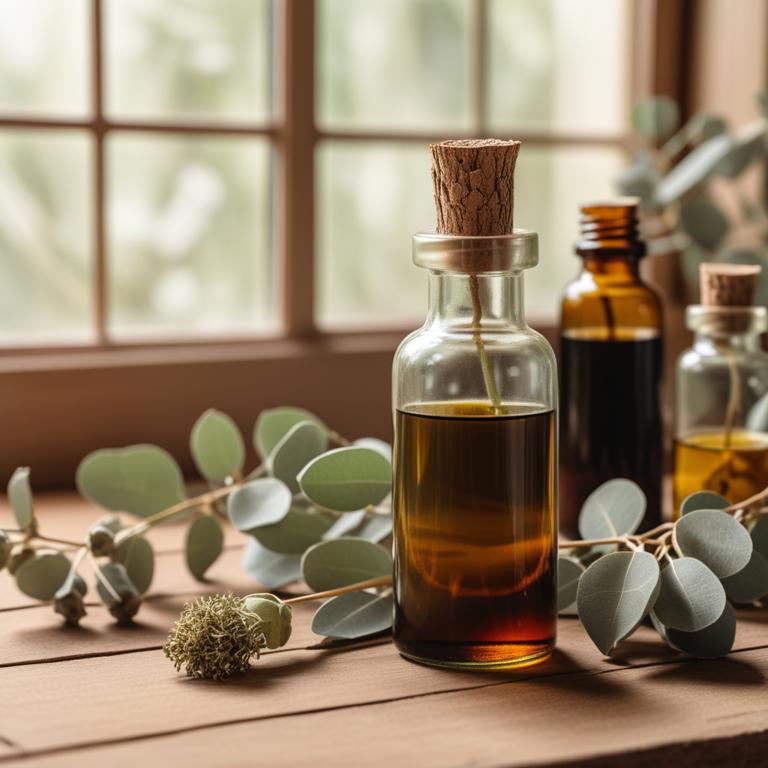
Eucalyptus globulus tinctures are a herbal preparation commonly used to treat inflammation and other related ailments, thanks to their anti-inflammatory and analgesic properties.
The tinctures work by reducing swelling and pain, making them an effective remedy for conditions such as arthritis and sprains.
The bioactive constituents of Eucalyptus globulus, including eucalyptol and camphor, are responsible for its therapeutic effects, which help to reduce inflammation and promote healing.
The benefits of using Eucalyptus globulus tinctures to treat inflammation include reduced pain and swelling, improved mobility, and a faster recovery time.
Related Study
According to "The American journal of Chinese medicine", Eucalyptus globulus tinctures for inflammation have been found to suppress IL-1β secretion via the regulation of inflammasome activation, thereby providing scientific support for its traditional use in treating inflammation-related disorders.